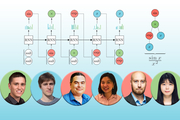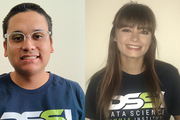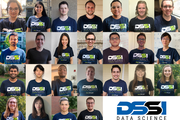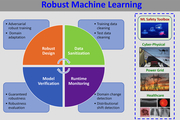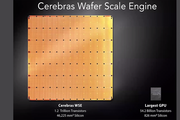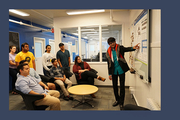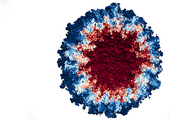Did you know we have a monthly newsletter? View past volumes and subscribe.
Novel deep learning framework for symbolic regression
March 18, 2021 -
LLNL computer scientists have developed a new framework and an accompanying visualization tool that leverages deep reinforcement learning for symbolic regression problems, outperforming baseline methods on benchmark problems. The paper was recently accepted as an oral presentation at the International Conference on Learning Representations (ICLR 2021), one of the top machine learning...
CASC research in machine learning robustness debuts at AAAI conference
Feb. 10, 2021 -
LLNL’s Center for Applied Scientific Computing (CASC) has steadily grown its reputation in the artificial intelligence (AI)/machine learning (ML) community—a trend continued by three papers accepted at the 35th AAAI Conference on Artificial Intelligence, held virtually on February 2–9, 2021. Computer scientists Jayaraman Thiagarajan, Rushil Anirudh, Bhavya Kailkhura, and Peer-Timo Bremer led...
Lawrence Livermore computer scientist heads award-winning computer vision research
Jan. 8, 2021 -
The 2021 IEEE Winter Conference on Applications of Computer Vision (WACV 2021) on Wednesday announced that a paper co-authored by LLNL computer scientist Rushil Anirudh received the conference’s Best Paper Honorable Mention award based on its potential impact to the field. The paper, titled "Generative Patch Priors for Practical Compressive Image Recovery,” introduces a new kind of prior—a...
LLNL physicist wins Young Former Student award
Dec. 16, 2020 -
Texas A&M University’s Department of Nuclear Engineering on December 10 announced it has honored LLNL physicist Kelli Humbird with its 2020-21 Young Former Student award for her work at LLNL in combining machine learning with inertial confinement fusion (ICF) research. Humbird graduated from Texas A&M with a PhD in nuclear engineering in 2019. Since joining the Laboratory as an intern in 2016...
Data Science Institute collaborates with Livermore Lab Foundation and UC Merced to host two year-long fellowships
Dec. 16, 2020 -
Early this spring, the Livermore Lab Foundation (LLF) in partnership with the UC Merced, awarded two rising seniors, Jose Garcia-Esparza and Teagan Zuniga, two one-year $15,000 fellowships to participate in the Lab’s Data Science Summer Institute (DSSI) and continue a part-time fellowship at the Lab for the remainder of the 2020–21 school year.
The fellowships allow deserving students...
After successful virtual summer, DSSI looks ahead to 2021
Dec. 14, 2020 -
In a year distinguished by the COVID-19 pandemic, LLNL’s Data Science Summer Institute (DSSI) pivoted quickly to an all-virtual program. The 28 students in the class of 2020 worked from their homes and attended online seminars, one-on-one mentoring sessions, team-building games, and other activities. Instead of an in-person poster session, the students participated in a virtual Summer Slam...
NeurIPS papers aim to improve understanding and robustness of machine learning algorithms
Dec. 7, 2020 -
The 34th Conference on Neural Information Processing Systems (NeurIPS) is featuring two papers advancing the reliability of deep learning for mission-critical applications at LLNL. The most prestigious machine learning conference in the world, NeurIPS began virtually on Dec. 6. The first paper describes a framework for understanding the effect of properties of training data on the...
DOE announces five new energy projects at LLNL
Nov. 13, 2020 -
The DOE today announced two rounds of awards for the High Performance Computing for Energy Innovation Program HPC4EI), including five projects at LLNL. HPC4EI connects industry with the computational resources and expertise of the DOE national laboratories to solve challenges in manufacturing, accelerate discovery and adoption of new materials and improve energy efficiency. The awards were...
What put LLNL at the center of U.S. supercomputing in 2020?
Nov. 12, 2020 -
The HPC world is waiting for the next series of transitions to far larger machines with exascale capabilities. By this time next year, the bi-annual ranking of the Top500 most powerful systems will be refreshed at the top as Frontier, El Capitan, Aurora, and other DOE systems come online. While LLNL was already planning around AI acceleration for its cognitive simulation aims and had a number...
From intern to mentor, Nisha Mulakken builds a career in bioinformatics
Nov. 3, 2020 -
The COVID-19 pandemic has sparked a wave of new research and development at the Lab, and Nisha Mulakken is very busy. The biostatistician has enhanced the Lawrence Livermore Microbial Detection Array (LLMDA) system with detection capability for all variants of SARS-CoV-2. The technology detects a broad range of organisms—viruses, bacteria, archaea, protozoa, and fungi—and has demonstrated...
AI gets a boost via LLNL, SambaNova collaboration
Oct. 20, 2020 -
LLNL has installed a state-of-the-art artificial intelligence (AI) accelerator from SambaNova Systems, the National Nuclear Security Administration (NNSA) announced today, allowing researchers to more effectively combine AI and machine learning (ML) with complex scientific workloads. LLNL has begun integrating the new AI hardware, SambaNova Systems DataScale™, into the NNSA’s Corona...
LLNL, ANL and GSK provide early glimpse into Cerebras AI system performance
Oct. 13, 2020 -
AI chip and systems startup Cerebras was one of many AI companies showcased at the AI Hardware Summit which concluded last week. Cerebras invited collaborators from LLNL, Argonne National Laboratory, and GlaxoSmithKline to talk about their early work on Cerebras machines and future plans. Livermore Computing's CTO Bronis de Supinski said, “We have this vision for performing cognitive...
Machine learning speeds up and enhances physics calculations
Oct. 1, 2020 -
Interpreting data from NIF’s cutting-edge high energy density science experiments relies on physics calculations that are so complex they can challenge LLNL supercomputers, which stand among the best in the world. A collaboration between LLNL and French researchers found a novel way to incorporate machine learning and neural networks to significantly speed up inertial confinement fusion...
DL-based surrogate models outperform simulators and could hasten scientific discoveries
June 17, 2020 -
Surrogate models supported by neural networks can perform as well, and in some ways better, than computationally expensive simulators and could lead to new insights in complicated physics problems such as inertial confinement fusion (ICF), LLNL scientists reported. Read more at LLNL News.
AI identifies change in microstructure in aging materials
May 26, 2020 -
LLNL scientists have taken a step forward in the design of future materials with improved performance by analyzing its microstructure using AI. The work recently appeared online in the journal Computational Materials Science. Read more at LLNL News.
AI hardware for future HPC systems (VIDEO)
May 20, 2020 -
This interview with Brian Spears, who leads cognitive simulations at LLNL, covers the current state of evaluation of AI chips and how those will mesh with existing and future HPC systems. Watch on YouTube.
‘Yes, you can’: UC Merced students learning, growing at Livermore Lab
Feb. 26, 2020 -
Just 90 miles UC Merced lies one of the epicenters of the future of technology, innovation and national security. The university and lab have teamed up to lay the groundwork for a direct pipeline between the two, opening a door to research collaborations as well as job and internship opportunities for students and alumni. Read more at UC Merced.
Deep learning may provide solution for efficient charging, driving of autonomous electric vehicles
Feb. 4, 2020 -
LLNL computer scientists and software engineers have developed a deep learning-based strategy to maximize electric vehicle (EV) ride-sharing services while reducing carbon emissions and the impact to the electrical grid, emphasizing autonomous EVs capable of offering 24-hour service. Read more at LLNL News.
Department of Energy researchers share data management strategies at first-ever “Data Day”
Nov. 11, 2019 -
It’s become something of a mantra of the digital age: Data is the new currency. Especially in science, where it’s hard to find a single project that doesn’t involve generating or consuming massive amounts of data.
In light of the growing awareness of the critical importance of data management across the Department of Energy complex, more than 100 researchers from DOE national laboratories...
Successful simulation and visualization coupling proves the power of Sierra
Oct. 22, 2019 -
As the first National Nuclear Security Administration (NNSA) production supercomputer backed by GPU- (graphics processing unit) accelerated architecture, Sierra’s acquisition required a fundamental shift in how scientists at Lawrence Livermore National Laboratory (LLNL) program their codes to take advantage of the GPUs.
The majority of Sierra’s computational power—95 percent of its 125...

